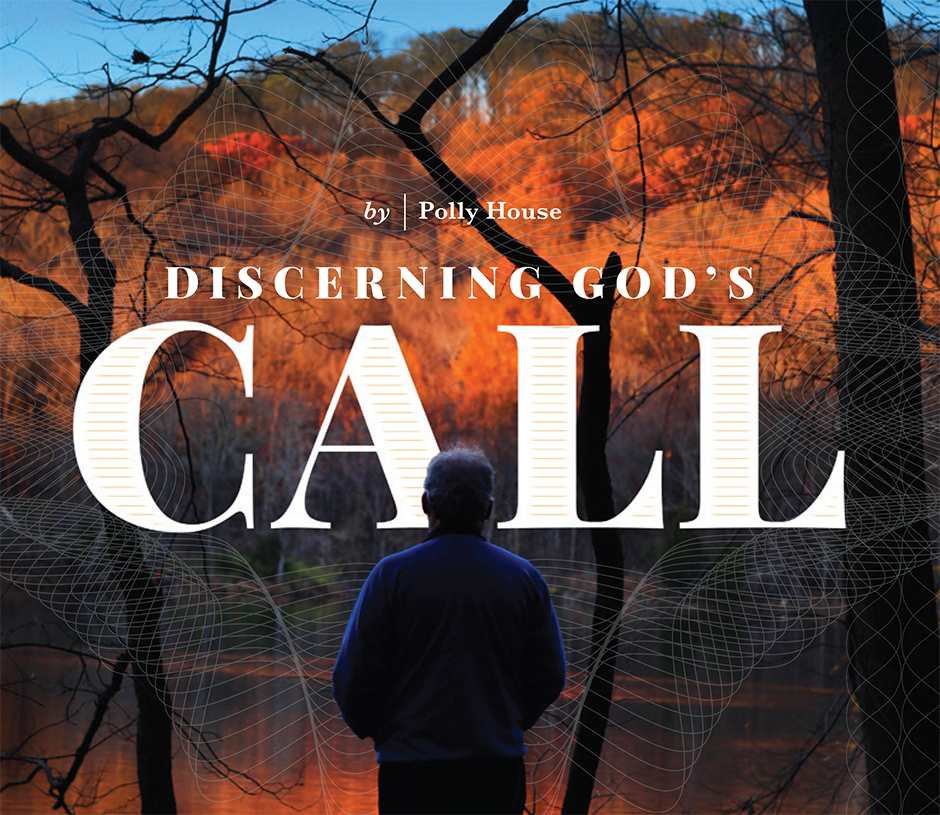


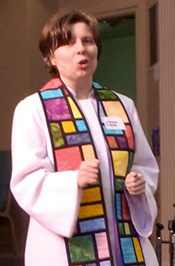
The Rev. Ruth Marston
COURTESY PHOTO
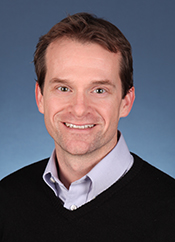
The Rev. Trip Lowery
GBHEM
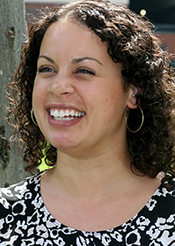
The Rev. April Casperson
UMNS/Kathy Gilbert
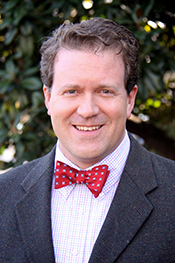
The Rev. Matthew Charlton
GBHEM
In Greek mythology, Pythia, the Oracle at Delphi, was the mouthpiece of the god Apollo. She was considered the most accurate of all the oracles and infallible.
However, she only would give prophecies on the seventh day of the nine warmest months of the year.
That didn’t help much if an ancient Greek needed confirmation in any of the other days of the year.
Fortunately, we can hear our God’s voice at any time in any place.
God does speak to us, primarily through Scripture that reveals God’s will and gives instructions for living. But, some people receive an additional, more specific, calling from God.
Hearing God’s voice
“In The United Methodist Church, we think of ‘calling’ in the context of hearing what God has said and trying to figure out how best to respond,” said the Rev. Trip Lowery, director of young adult ministry discernment and enlistment for the General Board of Higher Education and Ministry.
“We use the terms listen, discern and respond,” he said. “Be intentional to listening to what God is saying, as well as what you hear through other people. Be intentional about having your eyes and ears open.”
Affirmation is a big part of stories of call. Those who experience a call to service will almost never experience that call apart from other believers. Those called will hear others affirm their gifts and talents.
Doing what she loves
The Rev. Ruth Marston, associate pastor at First United Methodist Church in Olympia, Washington, grew up in Puyallup (Washington) United Methodist Church. She was baptized there and attended with her mother and three siblings.
Connecting with people her own age as well as the ages of her parents and grandparents, she found, “Church was the place where I was my best self, outgoing instead of shy, generous and patient.”
Marston was 12 when her “burning bush” moment came. It was on the morning she attended worship by herself for the first time.
As the music of the first hymn swelled, she said, “The light changed. Next to me was a family friend who was singing along with the hymn, which was slightly surprising because he had passed away the year before. I felt that I was surrounded by a cloud of witnesses. I heard the words, or felt them, as every piece of me vibrated with them, ‘Feed my sheep.’
“And with all the eloquence I could muster at the time, I responded in my heart with ‘Uhhh, what?’
“‘Feed my sheep,’ I heard again. And then the hymn was over. The music stopped. The light returned to normal, and I was alone in the pew. I looked around and no one else had noticed anything out of the ordinary. But because I was so afraid of what it meant and knowing the challenges coming with being a pastor, I kept this moment in my heart until I was 19.”
As a college student on a summer mission trip, Marston met Sami, an older student working with their group.
The last night of the mission trip, Sami asked Marston if she could talk with her.
“She just burst out, ‘The Lord God put it on my heart that you’re beautiful and yes. What does that even mean?’” Marston said.
“So we talked and prayed. It was a holy time of communion,” she said. “I understood at that point the confirmation of my call.”
After undergrad, she attended Claremont School of Theology in California. She sought a seminary “that was a good fit theologically,” she said, and one “based on the needs of my future ministry setting” where she would “be a Christian leader in a pluralistic society.”
All told, it cost Marston $250,000 in tuition and room and board to prepare to become an elder. Scholarships, including some from Higher Education and Ministry, covered most of the costs. Yet, she still graduated with $55,000 in student loans.
“This was such a leap of faith, because the United Methodist process means that graduating from seminary doesn’t guarantee ordination,” she added. “We, as a denomination, need to take a long, hard look at the financial burdens higher education puts on future pastors.”
During her time as a provisional elder, Marston learned following means trusting and listening to God.
She was ordained elder in July 2015.
While she spent many years trying to avoid thinking about being a pastor, she said, “I discovered everything I wanted to do was (ordained) ministry. And I am very content to be where I am.”
Marston affirms United Methodist teaching that every Christian is called to ministry through baptism. She said laypeople do miracles that reach and touch lives in profound ways that help bring about the kingdom of God on earth.
What would she say to young people seeking ordination?
“I’d say that it’s the best work in the whole world, even on the days that drop you to the floor in heartbreak,” she said. “I’m blessed to be able to serve God and neighbor day in and day out and it’s rare to find a job that combines a modest, yet livable, wage with changing the world.”
Shift in call
The Rev. April Casperson’s call came as a teenager when she and her family began attending Asbury South United Methodist Church in Columbus, Ohio. Before, they had not attended church regularly.
“I enjoyed it immensely and became involved in the youth group,” she said. “I was really searching outside of myself for something that would fulfill me and also bring me a sense of vocational security.”
One Sunday morning, she was listening to the sermon and heard a voice in her head: “You can do this.”
Her first instinct was to dismiss that voice. She had been reading books on psychology and thought, “‘Oh, that’s my id!’ But then I realized that it was the voice of the Holy Spirit — and I panicked.
“But the more I thought about it,” she said, “the more it felt right. ...Looking back it was a call to set-apart ministry, that lifelong commitment to God, the people of God, The United Methodist Church and the world.”
Casperson’s church family encouraged and supported her. When an associate pastor position opened up at Asbury South, they hired her — a 19-year-old college sophomore — to fill it.
“I appreciated the opportunity to serve and didn’t take lightly the trust they had in me,” Casperson said. “I loved working at the church.”
Anticipating becoming a pastor, she enrolled in the Methodist Theological Seminary in Ohio to get her Master of Divinity degree. But, God had a surprise in store for her.
A few weeks before graduation, a general email was sent out by MTSO about a new position that had been created: an admissions recruiter. She read and deleted the email.
To her surprise, a minute later, the message was forwarded to her from the vice president of the school. Her message said, “April, we hope that you will consider applying for this position.”
She was floored!
Still feeling called to pastoral ministry, the idea of serving in an academic institution intrigued her. She decided to “pray, discern, try on this position, and if it wasn’t the right next step in my ministry journey, I would leave gracefully after six months and request a full-time church position in July.”
She was hired and within a few days knew serving in a school just fit. She discerned her work involved the three areas abut which she had preached over and over:
Education – the need to learn in order to grow in one’s faith.
Vocation – what is it that God is calling you to be and to do?
Justice – what does it mean to seek God’s justice and to transform the world?
Still feeling called to ordination, she sensed her ministry would have “a different flavor — one of justice and compassion — beyond the local church. And then I started learning about the order of deacon. The options were much more diverse than I had allowed myself to see all of those years, and God was opening my eyes.”
Casperson is now vice president of institutional advancement at MTSO and also serves as deacon-in-residence at South Asbury.
“The Holy Spirit is using me, my skills, my education and my desires to serve students and the church,” she said.
Helping students interpret their call
The Rev. Matthew Charlton is Higher Education and Ministry’s assistant general secretary for collegiate ministries. He said the agency is making efforts to help people explore God’s call from the beginning into various forms of lay and ordained ministry.
The agency’s “focus is on developing leaders for service in the church,” he said. “We also recognize that ministry is as broad as the imagination of the Holy Spirit.” Collegiate ministry, he explained, creates “space for young people to experience God in their context and then respond in service to the world, a response that can take many forms.”
If you sense God is calling you to ministry of some sort, the first step is to talk to your pastor, Lowery said. “This is the person who should know you best in your spiritual quest.”
The local congregation is also part of discerning one’s call, Lowery said. “Succeeding conversations about the call are never as deep as the local church conversation should be.”
An ongoing conversation with a pastor and, in some cases, a discernment group, can help a person feeling a call gain confidence. The local church can offer opportunities to preach a few sermons, teach a Bible study or lead a youth group. All can help a person discern if pastoral ministry is one’s call.
“Another great reason to solidify the direction of the call is to be able to choose the best education path,” Lowery said. “Seminary is a very expensive place to try to determine the call. You want someone seminary trained to lead a local congregation, of course, but if their calling is in another area, a degree in business or economics might be better.”
Charlton added, “For ordained ministry in the church, there is a full process that engages the person in prayer, Bible study and conversation leading to candidacy and ordination. This process typically takes several years and is deeply formative.” For ministry in the church not requiring ordination, there are a number of possibilities, he said.
Higher Education and Ministry also aids discernment and preparation, Charlton says, by pointing to paths of service in the church, deploying resources and training people in annual conferences as mentors to guide and walk with candidates through academic preparation into the practice of ministry.
Polly House is a freelance writer and editor based in Nashville, Tennessee.
Gathering to discern God’s call
Two biennial events offer young people opportunities to explore ways to respond to God’s call.
NEXT is for young people to encounter God’s call for service in the world. It offers spiritual growth, leadership development and discernment toward missional service that usually does not require ordination. Learn more about NEXT in Atlanta on Nov. 4-6, 2016, at nextumc.org.
EXPLORATION is for young adults considering ordained ministry. The next gathering will be Nov. 3-5, 2017.